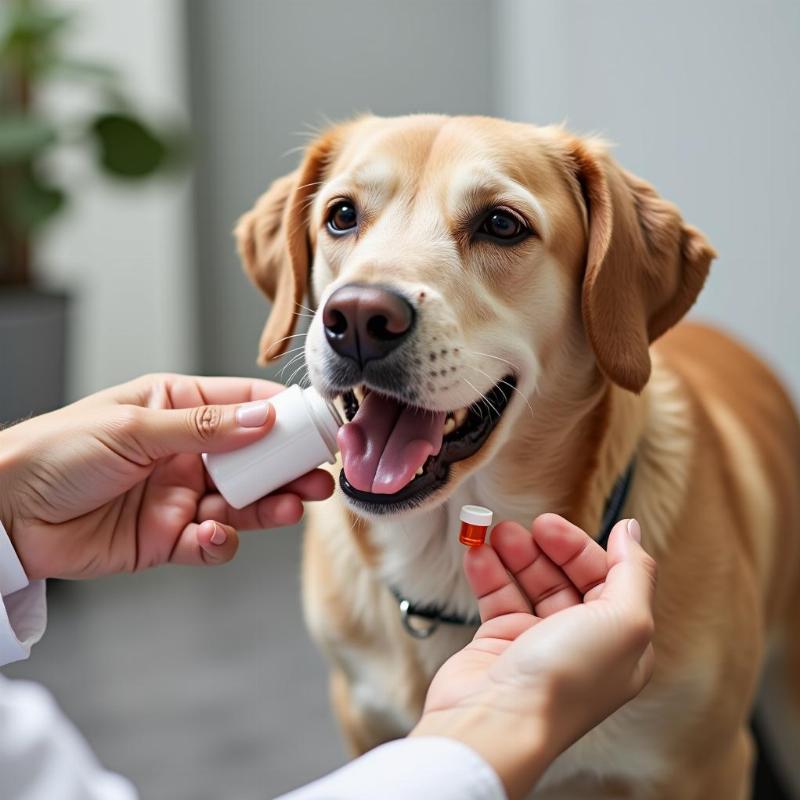Old dog coughing and wheezing can be distressing for both you and your furry companion. While a cough here and there might not be cause for alarm, persistent coughing and wheezing in older dogs warrants attention. Understanding the potential causes, treatment options, and when to seek immediate veterinary care is crucial for senior dog health. This article will guide you through everything you need to know about managing coughing and wheezing in your older dog.
Understanding Coughing and Wheezing in Senior Dogs
As dogs age, their immune systems can weaken, making them more susceptible to respiratory infections. Conditions like kennel cough, canine influenza, and even pneumonia can manifest as coughing and wheezing. Heart conditions, such as congestive heart failure, can also cause fluid buildup in the lungs, leading to similar symptoms. Furthermore, chronic bronchitis, tracheal collapse, and even allergies can trigger coughing and wheezing episodes. Sometimes, a simple foreign object lodged in the throat can be the culprit. Recognizing the nuances of these symptoms is the first step towards providing your senior dog with the care they need.
Common Causes of Coughing and Wheezing in Older Dogs
Several underlying health issues can lead to coughing and wheezing in senior dogs. Some of the most common include:
-
Respiratory Infections: Kennel cough, canine influenza, and pneumonia can cause inflammation and irritation in the airways, resulting in a persistent cough, often accompanied by wheezing.
-
Heart Disease: Congestive heart failure can lead to fluid buildup in the lungs, making it difficult for your dog to breathe and causing a cough and wheezing sounds.
-
Tracheal Collapse: This condition is more prevalent in smaller breeds and involves the weakening of the trachea, which can then collapse, obstructing airflow and leading to a honking cough and wheezing.
-
Chronic Bronchitis: Inflammation and mucus buildup in the bronchi can cause a persistent, productive cough. Wheezing may also occur.
-
Allergies: Just like humans, dogs can experience allergies to environmental triggers like pollen, dust mites, and mold. These allergies can manifest as coughing, wheezing, and sneezing.
-
Foreign Objects: Sometimes, a simple foreign object, such as a piece of grass or a small toy, can become lodged in the throat or airways, triggering coughing and wheezing.
When to Seek Veterinary Care
If your older dog is experiencing persistent coughing and wheezing, it’s crucial to seek veterinary care. While occasional coughs might not be cause for immediate concern, changes in breathing patterns, difficulty breathing, lethargy, loss of appetite, or a bluish tint to the gums warrant immediate attention. These could be signs of a serious underlying condition requiring prompt treatment.
Diagnosing and Treating Coughing and Wheezing
Your veterinarian will conduct a thorough physical examination and may recommend diagnostic tests such as blood work, chest X-rays, and possibly a bronchoscopy to identify the underlying cause of the coughing and wheezing. Treatment will depend on the diagnosis and may include antibiotics for infections, medications to manage heart conditions, bronchodilators to open airways, and anti-inflammatory medications to reduce inflammation and swelling.
 Senior Dog Taking Medication
Senior Dog Taking Medication
Home Care and Management
In addition to veterinary prescribed treatments, you can take steps at home to help manage your dog’s coughing and wheezing. Maintaining a clean and dust-free environment, using a humidifier to add moisture to the air, and avoiding exposure to irritants like smoke and strong perfumes can help alleviate symptoms. Providing your senior dog with a comfortable and stress-free environment is also essential.
Conclusion
Coughing and wheezing in older dogs can be a sign of various underlying conditions, ranging from relatively minor infections to more serious heart or respiratory issues. Early diagnosis and appropriate treatment are crucial for managing these symptoms and ensuring your senior dog’s well-being. If you notice your older dog coughing and wheezing, don’t hesitate to contact your veterinarian.
FAQ
- Is it normal for older dogs to cough occasionally? Occasional coughs can be normal, but persistent coughing and wheezing should be evaluated by a veterinarian.
- What are the signs of a serious respiratory problem in dogs? Difficulty breathing, bluish gums, lethargy, and loss of appetite are signs of a potentially serious respiratory issue.
- Can allergies cause coughing and wheezing in dogs? Yes, allergies to environmental triggers can cause respiratory symptoms like coughing and wheezing.
- How is tracheal collapse treated in dogs? Treatment for tracheal collapse can range from medication to manage symptoms to surgery in severe cases.
- What can I do at home to help my dog with coughing and wheezing? Maintaining a clean environment, using a humidifier, and avoiding irritants can help.
- When should I take my dog to the emergency vet for coughing and wheezing? If your dog is struggling to breathe, has blue gums, or seems very lethargic, seek immediate veterinary care.
- Can heart problems cause coughing and wheezing in dogs? Yes, congestive heart failure can lead to fluid buildup in the lungs, causing coughing and wheezing.
Related Articles
- my dog is coughing and sneezing
- older dog pants a lot
- old dog panting at night
- is downy safe for dogs to smell
- air fresheners safe for dogs
Beautdogs.us is your premier source for all things dog-related in the US. We offer expert advice on dog breeds, grooming, training, nutrition, and overall wellness. Whether you’re a new dog owner or a seasoned pro, Beautdogs.us provides reliable information, product recommendations, and a supportive community. Contact us today to learn more! Email: [email protected], Phone: +1 501-555-7529. Visit us at Beautdogs.us.